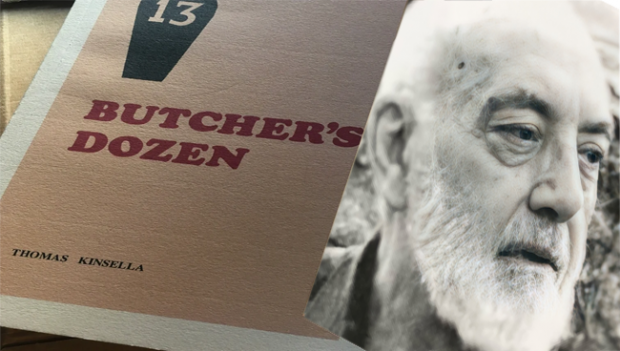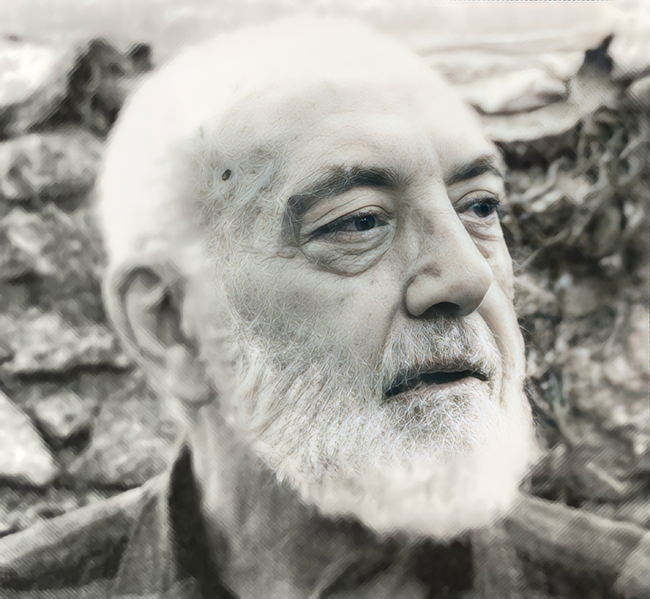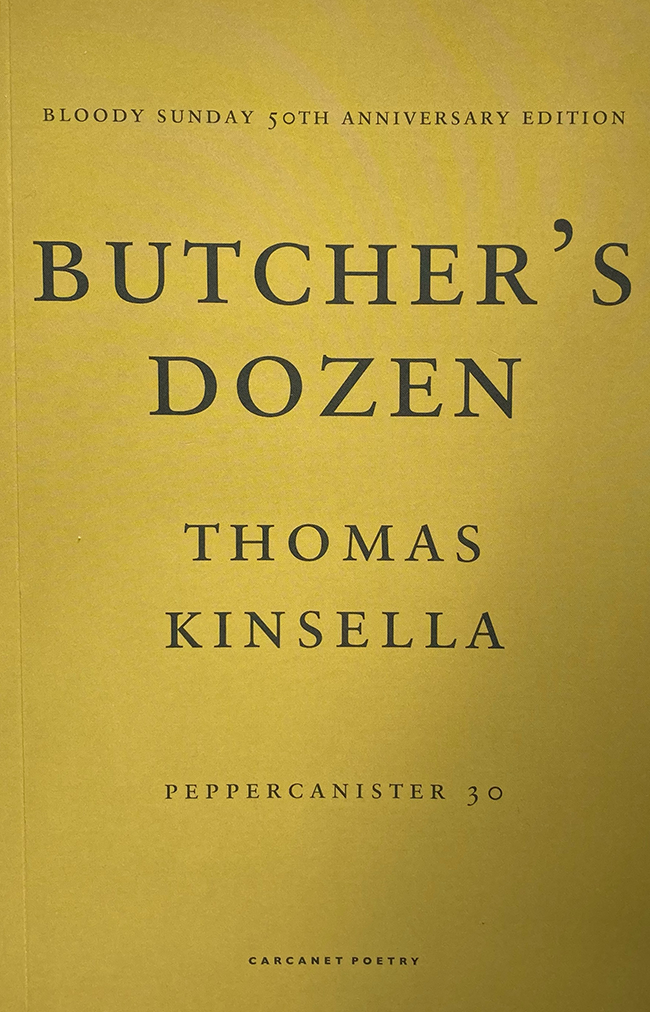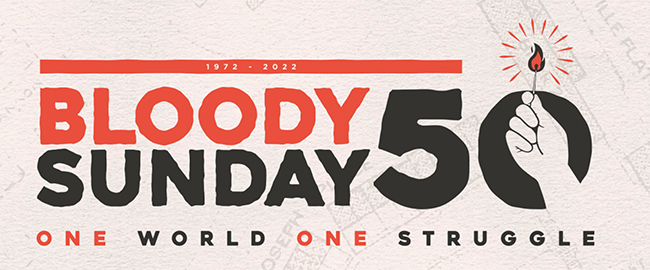28 January 2022
Thomas Kinsella’s ‘Butcher’s Dozen’ 50 years on
50th Anniversary of Derry’s Bloody Sunday

Eminent Irish poet Thomas Kinsella died in December 2021, just before the 50th anniversary of Bloody Sunday, the Widgery Tribunal and the poem he wrote and published swiftly in response.
The full title is ‘Butcher’s Dozen - a lesson for the octave of Widgery’. Originally published in pamphlet form by the Peppercanister Press in early 1972, it has been republished in a 50th anniversary edition by Carcanet Poetry. In a note on the poem Kinsella says he wrote it in response to “Lord Widgery’s cold putting aside of truth, the nth in a historic series of expedient falsehoods”. It was published within a week of Widgery’s report.
Kinsella writes of the rejection of his work by English readers and the loss of friendships as a result of the poem’s publication. While he was widely praised as one of Ireland’s foremost poets, Kinsella was never part of the academic, literary or political establishment. He did not share the ‘revisionist’ position that predominated within that establishment.

• Irish poet Thomas Kinsella
In ‘The Dual Tradition - an Essay on Poetry and Politics in Ireland’ (1995) Kinsella writes of “the transformation of the Unionist minority in the North” by partition “into a permanent supremacist majority which proceeded, in the name of democracy, to discriminate methodically against the newly created nationalist minority. This was in fact the purpose behind partition, establishing Northern Ireland in its present self-destructive state.”
The poem reflects the profound and widespread anger, not just at the British Army killings but at the widely broadcast lies of the British government, summed up in, but by no means confined to the Widgery Report. It is written with all the power of a truly great poet.
• — • — • — • — • — • — • — • — • — • — •
Butcher’s Dozen
By Thomas Kinsella

I went with Anger at my heel
Through Bogside of the bitter zeal
- Jesus pity! - on a day
Of cold and drizzle and decay.
A month had passed. Yet there remained
A murder smell that stung and stained.
On flats and alleys-over all-
It hung; on battered roof and wall,
On wreck and rubbish scattered thick,
On sullen steps and pitted brick.
And when I came where thirteen died
It shrivelled up my heart. I sighed
And looked about that brutal place
Of rage and terror and disgrace.
Then my moistened lips grew dry.
I had heard an answering sigh!
There in a ghostly pool of blood
A crumpled phantom hugged the mud:
“Once there lived a hooligan.
A pig came up, and away he ran.
Here lies one in blood and bones,
Who lost his life for throwing stones.”
• — • — •
More voices rose. I turned and saw
Three corpses forming, red and raw,
From dirt and stone. Each upturned face
Stared unseeing from its place:
“Behind this barrier, blighters three,
We scrambled back and made to flee.
The guns cried Stop, and here lie we.”
Then from left and right they came,
More mangled corpses, bleeding, lame,
Holding their wounds. They chose their ground,
Ghost by ghost, without a sound,
And one stepped forward, soiled and white:
“A bomber I. I travelled light
- Four pounds of nails and gelignite
About my person, hid so well
They seemed to vanish where I fell.
When the bullet stopped my breath
A doctor sought the cause of death.
He upped my shirt, undid my fly,
Twice he moved my limbs awry,
And noticed nothing. By and by
A soldier, with his sharper eye,
Beheld the four elusive rockets
Stuffed in my coat and trouser pockets.
Yes, they must be strict with us,
Even in death so treacherous!”
He faded, and another said:
“We three met close when we were dead.
Into an armoured car they piled us
Where our mingled blood defiled us,
Certain, if not dead before,
To suffocate upon the floor.
• — • — •
Careful bullets in the back
Stopped our terrorist attack,
And so three dangerous lives are done
- Judged, condemned and shamed in one.”
That spectre faded in his turn.
A harsher stirred, and spoke in scorn:
“The shame is theirs, in word and deed,
Who prate of justice, practise greed,
And act in ignorant fury - then,
Officers and gentlemen,
Send to their Courts for the Most High
To tell us did we really die!
Does it need recourse to law
To tell ten thousand what they saw?
Law that lets them, caught red-handed,
Halt the game and leave it stranded,
Summon up a sworn inquiry
And dump their conscience in the diary.
During which hiatus, should
Their legal basis vanish, good,
The thing is rapidly arranged:
Where’s the law that can’t be changed?
The news is out. The troops were kind.
Impartial justice has to find
We’d be alive and well today
If we had let them have their way.
Yet England, even as you lie,
You give the facts that you deny.
Spread the lie with all your power
- All that’s left; it’s turning sour.
Friend and stranger, bride and brother,
Son and sister, father, mother,
• — • — •
All not blinded by your smoke,
Photographers who caught your stroke,
The priests that blessed our bodies, spoke
And wagged our blood in the world’s face.
The truth will out, to your disgrace.”
He flushed and faded. Pale and grim,
A joking spectre followed him:
“Take a bunch of stunted shoots,
A tangle of transplanted roots,
Ropes and rifles, feathered nests,
Some dried colonial interests,
A hard unnatural union grown
In a bed of blood and bone,
Tongue of serpent, gut of hog
Spiced with spleen of underdog.
Stir in, with oaths of loyalty,
Sectarian supremacy,
And heat, to make a proper botch,
In a bouillon of bitter Scotch.
Last, the choice ingredient: you.
Now, to crown your Irish stew,
Boil it over, make a mess.
A most imperial success!”
He capered weakly, racked with pain,
His dead hair plastered in the rain;
The group was silent once again.
It seemed the moment to explain
That sympathetic politicians
Say our violent traditions,
Backward looks and bitterness
Keep us in this dire distress.
We must forget, and look ahead,
• — • — •
Nurse the living, not the dead.
My words died out. A phantom said:
“Here lies one who breathed his last
Firmly reminded of the past.
A trooper did it, on one knee,
In tones of brute authority.”
That harsher spirit, who before
Had flushed with anger, spoke once more:
“Simple lessons cut most deep.
This lesson in our hearts we keep:
Persuasion, protest, arguments,
The milder forms of violence,
Earn nothing but polite neglect.
England, the way to your respect
Is via murderous force, it seems;
You push us to your own extremes.
You condescend to hear us speak
Only when we slap your cheek.
And yet we lack the last technique:
We rap for order with a gun,
The issues simplify to one
- Then your Democracy insists
You mustn’t talk with terrorists!
White and yellow, black and blue,
Have learnt their history from you:
Divide and ruin, muddle through,
Not principled, but politic.
- In strength, perfidious; weak, a trick
To make good men a trifle sick.
We speak in wounds. Behold this mess.
My curse upon your politesse.”
• — • — •
Another ghost stood forth, and wet
Dead lips that had not spoken yet:
“My curse on the cunning and the bland,
On gentlemen who loot a land
They do not care to understand;
Who keep the natives on their paws
With ready lash and rotten laws;
Then if the beasts erupt in rage
Give them a slightly larger cage
And, in scorn and fear combined,
Turn them against their own kind.
The game runs out of room at last,
A people rises from its past,
The going gets unduly tough
And you have (surely ... ?) had enough.
The time has come to yield your place
With condescending show of grace
- An Empire-builder handing on.
We reap the ruin when you’ve gone,
All your errors heaped behind you:
Promises that do not bind you,
Hopes in conflict, cramped commissions,
Faiths exploited, and traditions.”
Bloody sputum filled his throat.
He stopped and coughed to clear it out,
And finished, with his eyes a-glow:
“You came, you saw, you conquered ... So.
You gorged - and it was time to go.
Good riddance. We’d forget - released -
But for the rubbish of your feast,
The slops and scraps that fell to earth
And sprang to arms in dragon birth.
• — • — •
Sashed and bowler-hatted, glum
Apprentices of fife and drum,
High and dry, abandoned guards
Of dismal streets and empty yards,
Drilled at the codeword ‘True Religion’
To strut and mutter like a pigeon
‘Not An Inch - Up The Queen’;
Who use their walls like a latrine
For scribbled magic-at their call,
Straight from the nearest music-hall,
Pope and Devil intertwine,
Two cardboard kings appear, and join
In one more battle by the Boyne!
Who could love them? God above...”
“Yet pity is akin to love,”
The thirteenth corpse beside him said,
Smiling in its bloody head,
“And though there’s reason for alarm
In dourness and a lack of charm
Their cursed plight calls out for patience.
They, even they, with other nations
Have a place, if we can find it.
Love our changeling! Guard and mind it.
Doomed from birth, a cursed heir,
Theirs is the hardest lot to bear,
Yet not impossible, I swear,
If England would but clear the air
And brood at home on her disgrace
- Everything to its own place.
Face their walls of dole and fear
And be of reasonable cheer.
• — • — •
Good men every day inherit
Father’s foulness with the spirit,
Purge the filth and do not stir it.
Let them out! At least let in
A breath or two of oxygen,
So they may settle down for good
And mix themselves in the common blood.
We are what we are, and that
Is mongrel pure. What nation’s not
Where any stranger hung his hat
And seized a lover where she sat?”
He ceased and faded. Zephyr blew
And all the others faded too.
I stood like a ghost. My fingers strayed
Along the fatal barricade.
The gentle rainfall drifting down
Over Colmcille’s town
Could not refresh, only distil
In silent grief from hill to hill.

• Thomas Kinsella, Freeman of Dublin, on his 90th birthday, hosted in the Mansion House by Ardmhéara Bhaile Átha Cliath Mícheál Mac Donncha.
• • • • • • •

See Bloody Sunday Trust
Follow us on Facebook
An Phoblacht on Twitter
Uncomfortable Conversations

An initiative for dialogue
for reconciliation
— — — — — — —
Contributions from key figures in the churches, academia and wider civic society as well as senior republican figures





